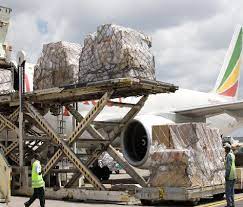IATA in cautious optimism, as Africa Air cargo rebounds 2.9pc in July

Rebounding trade with China and capacity growth, combined to help African airlines post their strongest performance in July 2023. Overall, cargo volumes increased 2.9pc relative to July 2022 while capacity was up 11 percent over the same period, the International Air Transport Association IATA, says in its latest analysis of the air cargo market. This was despite a sub-par performance in global manufacturing and exports.
Resurgent Africa–Asia routes were the prime movers for the region, registering a 10.3pc surge in cargo demand. Africa’s performance was in harmony with a positive curve that shows a rebounding industry since February. IATA says global air cargo demand in July 2023, was tracking just 0.8pc below the previous year’s levels.
IATA says that although “demand is now basically flat compared to 2022, this is an improvement on recent months’ performance that is particularly significant given declines in global trade volumes and rising concerns over China’s economy.”
Global CTKs tracked were 0.8pc below July 2022 levels (-0.4pc for international operations) but still a significant improvement over the previous month’s performance (-3.4pc). Capacity, measured in available cargo tonne-kilometers (ACTKs), was up 11.2pc relative to July 2022 (10.8pc for international operations). The strong uptick in ACTKs reflects the growth in belly capacity (29.3pc year-on-year) due to the summer season.
IATA also cites several factors that shaped global performance during the month. In July, both the manufacturing output Purchasing Managers Index or PMI (49.0) and new export orders PMI (46.4) were below the critical threshold represented by the 50 mark, indicating a decline in global manufacturing production and exports.
IATA further said “Global cross-border trade contracted for the third month in a row in June, decreasing 2.5pc year-over-year, reflecting the cooling demand environment and challenging macroeconomic conditions. The difference between the annual growth rates of air cargo and the global goods trade narrowed to -0.8 percentage points in June. While air cargo growth is still lagging world trade, the gap is the narrowest since January 2022.”
On the upside, the airline industry lobby observes that the global supplier delivery time PMI was 51.9 in July, signaling fewer supply chain delays. Additionally, all major economies, except China, had PMIs above 50. The U.S., Europe, and Japan recorded PMIs of 54.2, 57.7, and 50.4, respectively.
Inflation saw a mixed picture in July, with the increase in US consumer prices picking up pace for the first time in 13 months. Meanwhile, in China, both consumer and producer prices fell, pointing to a possible deflationary economy.
“Compared to July 2022, demand for air cargo was basically flat. Considering we were 3.4pc below 2022 levels in June, that’s a significant improvement. And it continues a trend of strengthening demand that began in February. How this trend will evolve in the coming months will be something to watch carefully. Many fundamental drivers of air cargo demand, such as trade volumes and export orders, remain weak or are deteriorating. And there are growing concerns over how China’s economy is developing. At the same time, we are seeing shorter delivery times, which is normally a sign of increasing economic activity. Amid these mixed signals, strengthening demand gives us good reason to be cautiously optimistic,” said Willie Walsh, IATA’s Director General.

 African Heads of state head to South Korea next week for Summit talks
African Heads of state head to South Korea next week for Summit talks
 Trading leads as main source of income for Ugandans
Trading leads as main source of income for Ugandans
 New leadership for bankers’ umbrella as total assets top $12 billion
New leadership for bankers’ umbrella as total assets top $12 billion
 Brussels Airlines to announce Nairobi service
Brussels Airlines to announce Nairobi service
 SITA promises enhanced travel experience after Materna acquisition
SITA promises enhanced travel experience after Materna acquisition
 Saudia’s 105 aircraft order stretches A320neo lead over rival Max
Saudia’s 105 aircraft order stretches A320neo lead over rival Max
